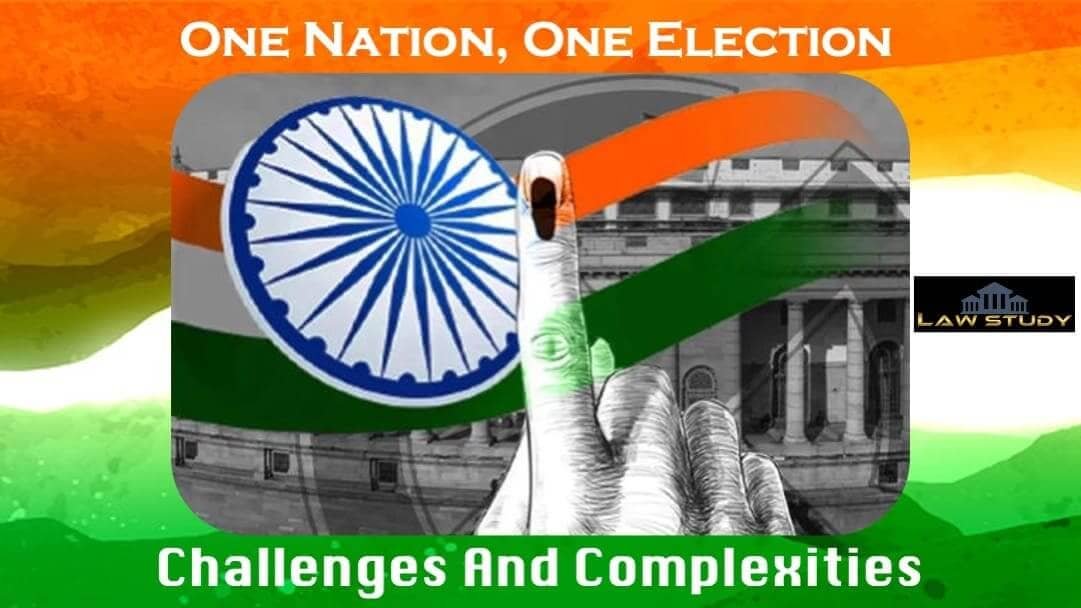One Nation, One Election, challenges and complexities.
The concept of “One Nation, One Election” in India, which proposes the synchronization of Lok Sabha (parliamentary) and state legislative assembly elections, has been a topic of discussion for decades. While it aims to reduce the frequency and associated costs of elections, this proposal poses numerous challenges and complexities, particularly within India’s federal system.
In this article, we will explore the historical background, legal hurdles, logistical challenges, and potential implications of implementing simultaneous elections in India.
Historical Background
The idea of simultaneous elections, also known as “One Nation, One Election,” was officially proposed by the Election Commission of India in its 1983 report. The core objective was to streamline the election process, reduce expenses, and enhance administrative efficiency.
This concept gained prominence when former Prime Minister Atal Bihari Vajpayee championed it in 1999. Despite these efforts, legislative changes to implement the idea were not realized.
In subsequent years, the concept of simultaneous elections remained on the agenda. In 2017, Niti Aayog released a paper discussing the feasibility of this idea, and in 2018, the Law Commission of India released a draft working paper outlining the legal and constitutional aspects.
Prime Minister Narendra Modi also emphasized the need for a debate on simultaneous elections in his Independence Day speech in 2019.
Several all-party meetings and discussions have taken place to assess the feasibility and merits of this proposal. In 2020, the Parliamentary Standing Committee on Law and Justice, led by Member of Parliament Anand Sharma, examined the issue and sought input from various stakeholders.
Most recently, a committee under the chairmanship of Former President Ram Nath Kovind has been constituted to study the electoral process in India.
Challenges to Federalism
One of the most significant challenges posed by simultaneous elections is its impact on India’s federal structure. India is a diverse nation with a federal system that divides powers between the central and state governments. Implementing simultaneous elections could potentially undermine the autonomy and independence of state governments, leading to conflicts between the Center and the states.
In India, elections are celebrated as festivals of democracy, with a population of nearly 150 crore people. Conducting simultaneous elections on such a massive scale poses a logistical challenge. Careful planning and coordination are essential, and simultaneous elections could complicate this process.
Voter Fatigue vs. Information Overload
Proponents argue that simultaneous elections can reduce voter fatigue by consolidating various elections into one. However, critics contend that voters may face information overload since they would have to choose leaders at multiple levels of government simultaneously. Each voter may have different considerations and preferences at the national, state, and regional levels, which simultaneous elections could blur. Local issues might be overshadowed by national ones, potentially affecting voters’ decision-making abilities.
Constitutional Amendments and Legal Changes
Implementing “One Nation, One Election” would require extensive constitutional amendments, legal changes, and political consensus, making it a complex and time-consuming process.
Several key provisions of the Indian Constitution, including Articles 83, 85, 172, 174, and 356, would need to be amended. Additionally, statutory laws would require modification to align with the proposed changes. Ensuring fixed tenures for Union and state assemblies is a crucial aspect of this process.
Amending the Constitution necessitates a two-thirds majority in both Houses of Parliament, adding to the complexity. States must also provide their consent, and regional parties may have reservations about the potential infringement on their powers and autonomy.
Coordination Across Government Levels
Coordinating the terms of different levels of government, such as central, state, and local, to coincide with the proposed election cycle is legally intricate.
State governments vary in their term durations, and some states have special provisions under Article 371 of the Constitution. Given the considerable autonomy granted to state governments, they may resist any changes that encroach on their powers. This would require amendments to laws governing local body elections to align them with the new election cycle.
Financial and Administrative Challenges
While simultaneous elections may reduce election expenditures in the long run, implementing the concept would demand substantial financial and administrative resources. Allocating budgets and coordinating resources for such a significant change would require a sound legal framework.
Moreover, anti-defection laws may need to be amended to prevent legislators from switching parties based on the election cycle, which could undermine the spirit of simultaneous elections.
Impact on the Judiciary
Simultaneous elections could lead to an increase in the number of cases in courts at various levels (national, state, and local) during election periods, potentially affecting the judicial process. The legal system would need to adapt to this increased workload.
Political Consensus and Stakeholder Agreement
Achieving political consensus among diverse political parties, particularly regional ones, is a formidable challenge. Convincing all political stakeholders to agree on the necessary legal changes and constitutional amendments may be a lengthy and contentious process.
while the idea of “One Nation, One Election” may be a topic of discussion, its implementation in India presents numerous legal, logistical, and political challenges. Balancing the principles of federalism, ensuring voter representation, and addressing the complexities of India’s diverse political landscape are crucial considerations. The feasibility and desirability of this concept remain subjects of ongoing political discussion and debate in India.

























